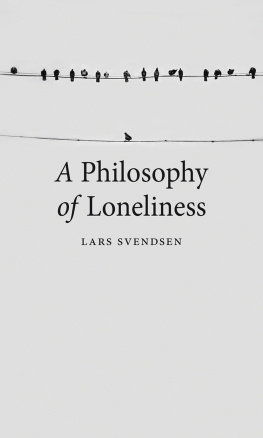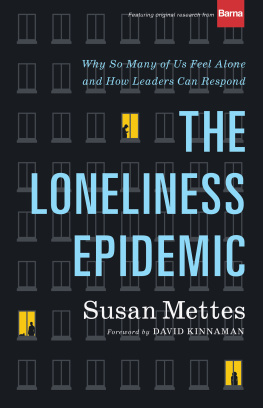A PHILOSOPHY OF LONELINESS

A Philosophy of Loneliness
Lars Svendsen
REAKTION BOOKS
For Siri, Iben and Luna
Published by Reaktion Books Ltd
Unit 32, Waterside
4448 Wharf Road
London N1 7UX, UK
www.reaktionbooks.co.uk
First published in English 2017
English-language translation Reaktion Books 2017
English translation by Kerri Pierce
This book was first published in 2015 by Universitetsforlaget, Oslo
under the title Ensomhetens Filosofi by Lars Fr. H. Svendsen
Copyright Universitetsforlaget 2015
This translation has been published with the
financial support of NORLA
All rights reserved
No part of this publication may be reproduced, stored in a retrieval system, or transmitted, in any form or by any means, electronic, mechanical, photocopying, recording or otherwise, without the prior permission of the publishers
Printed and bound in Great Britain
by Bell & Bain, Glasgow
A catalogue record for this book is available from
the British Library
eISBN: 9781780237930
Contents
ONE
The Essence of Loneliness
TWO
Loneliness as Emotion
THREE
Who are the Lonely?
FOUR
Loneliness and Trust
FIVE
Loneliness, Friendship and Love
SIX
Individualism and Loneliness
SEVEN
Solitude
EIGHT
Loneliness and Responsibility
Introduction
All is loneliness here for me
Loneliness here for me...
Loneliness
MOONDOG
A lmost all I thought I knew about loneliness proved false. I thought more men than women were lonely, and that lonely people were more isolated than others. I assumed that the significant increase in the number of single dwellers would notably impact the number of lonely individuals. I thought social media generated more loneliness by displacing ordinary sociability. I also believed that loneliness, despite being a subjective phenomenon, could be better understood in the context of social surroundings than individual disposition. I believed the Scandinavian countries had higher degrees of loneliness, and that these numbers were increasing. Furthermore, I assumed that this increase was connected to late modern individualism, and that individualistic societies had higher rates of loneliness than collective societies.
Never have I worked with a subject that overturned to such an extent all the assumptions I brought to the table. And these preconceptions are quite widespread. Indeed, they can be considered the standard picture given to us by the mass media, where expressions such as loneliness epidemic are common: at the moment I am writing this, a Google search of loneliness + epidemic returns almost 400,000 hits. Yet when it comes to the problem of loneliness, the image created by all these assumptions is severely misleading. Indeed, it is difficult to find any other loneliness epidemic than the one present in the mass media itself, in which use of the term loneliness has been significantly rising for years. Loneliness is receiving steadily more attention, but that does not mean there is more of it out there.
Nonetheless, there is one assumption that rings true: loneliness can be a serious problem for those whom it affects. For many people, it significantly impacts their quality of life, not to mention their physical and mental health. However, loneliness is a difficult subject to address, because it is so laden with shame. At the same time, our best moments can come when we are alone. Solitude, as we tend to call it in this case, tells us something important about ourselves and our place in the world. This book is the result of my attempts to discover what exactly loneliness is, whom it affects, why the emotion of loneliness occurs, lingers and disappears, and how we can relate to loneliness as individuals and as a society.
A General Human Phenomenon
There is no need for me to describe the emotion of loneliness. You know it from your childhood, from a day when it seemed as though everyone else but you had a playmate; from an evening spent alone, though you would dearly have liked some company; from the party where you hardly knew a soul and stood surrounded by people busily engaged with each other; from the night you lay next to your girlfriend or boyfriend, well cognizant of the fact that the relationship was over; and from being in the empty apartment after they had left for the last time.
There is always a price to pay for love, and loneliness is part of that price. Anyone who cares about or loves another person will experience loneliness when that person is no longer there, when they have left you either physically or emotionally. Of course, you can always try to make yourself invulnerable by avoiding forming close ties to others, but the price for that is an even more substantial loneliness.
Loneliness detaches you from others in a meaningful way, and in that respect it also detaches your from yourself, from important sides of yourself that can only exist and develop through your ties to other people. Stendhal writes: Everything can be acquired in solitude, except character. However, we have to take it one step further. We also need other people to need us.
You can be lonely in a crowd or at home, out in nature or in an empty church. Countless songs have been written about loneliness, but none seems to capture its essence quite as well as All is Loneliness, with its repetitive and crushing melancholy. The song was originally written by the blind and homeless New York artist Moondog (19161999). He wrote the song while sitting in a doorway in Manhattan in the middle of one of the worlds most densely populated cities. As Georg Simmel observes in his essay The Metropolis and Mental Life, there is scarcely any place one feels so lonely as in a metropolis. The gloomy image of the big city is well illustrated by a cartoon from the New Yorker from 2004 showing a street vendor with a sign that says: Eye Contact, $1.00. Loneliness certainly exists in large cities, but it is not only found there. Loneliness exists wherever people exist, and it does not seem to be any more prevalent in a metropolis than in smaller towns or rural areas.
Everyone is probably lonely from time to time. A person who has never felt lonely presumably suffers from some emotional lack or defect. The reason for this is simple. From the time they are very young, humans require a connection to others, and it is impossible for this need to be met at every single moment during a persons life. On the other hand, it must be conceded that a large percentage of respondents on surveys on the subject claim that they are never lonely. I interpret this to mean that, typically speaking, they are not lonely, but that they certainly know the feeling, and that loneliness is a standing possibility in their lives.
In fact, many people claim that we are living today in the the age of loneliness,surged at certain times, for instance during the Enlightenment and Romantic eras, but unlike boredom it is directly tied to social changes occurring in those times, since loneliness had long been established as a general human emotion. Nonetheless, the last three decades have seen an increase in loneliness studies, and even though increased awareness of a problem might give us reason to think its severity is also increasing, we have no basis for assuming that to be the case here.
Moreover, when I differentiate in this book between the lonely and the non-lonely, these idealizations can create the impression that individuals are so uniform that they can be divided into one group or the other, with a clear line drawn between them, whereas in reality we are talking about a continuum. General statements about loneliness must always be read with the idea in mind that enormous variation exists in both the causes and experiences of loneliness. Obviously, the emotion experienced by a bullying victim is primarily due to external causes, whereas the persistent loneliness of a person whose entire life has been spent surrounded by friends and a loving family must instead be sought in that individuals inner emotional and cognitive dispositions or in the development of them. General statements such as the lonely have a stronger tendency towards













